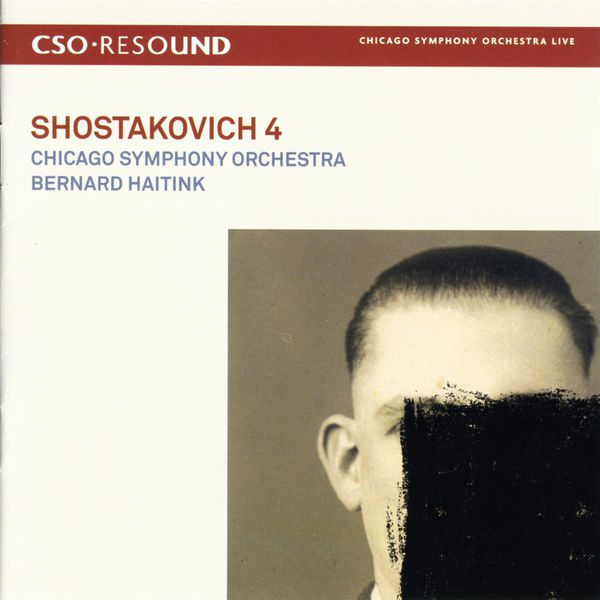
Streaming ilimitado
Escute agora este álbum em alta qualidade nos nossos aplicativos
Iniciar meu período de teste e começar a escutar este álbumCurta este álbum nos aplicativos Qobuz com a sua assinatura
AssinarCurta este álbum nos aplicativos Qobuz com a sua assinatura
Idioma disponível: inglês
The last of Dmitry Shostakovich's youthful, experimental symphonies, the Symphony No. 4 (1935-1936) marked a critical turning point, for its modernist tendencies provoked a hostile article in Pravda, thought to have been written by Stalin himself to intimidate the composer. Because of this rebuke, the symphony was withdrawn from performance and not played again until 1961, so due to its comparatively late absorption in the repertoire, it is one of the least played of Shostakovich's symphonies. Yet this is one of his most gripping scores, full of volatile expressions and memorable ideas, and its expansive form, caustic themes, complex developments, and wide emotional range make it comparable in many ways to the symphonies of Gustav Mahler, on which it was partly modeled. Bernard Haitink and the Chicago Symphony Orchestra present this masterpiece in the CSO Resound line, and the results are breathtaking in this transparent audiophile recording. Haitink's long career of conducting Shostakovich puts him among the most authoritative interpreters, and he leads the orchestra with assurance through the work's mercurial moods and carefully guides it through treacherous technical difficulties, perhaps most impressively in the fugal flurries of the first movement's Presto section. The sound throughout is detailed, yet also spacious, so listeners have all the advantages of one without losing the other, and the crisp lines stand out all the more because of the depth of the reproduction. The symphony is paired with a bonus DVD, which features a documentary on Shostakovich, Is Music Dangerous?, with narrator Gerard McBurney and actor Nicholas Rudall, and excerpts from the CSO's performance of the Symphony No. 4.
© TiVo
Você está escutando amostras.
Escute mais de 100 milhões de músicas com um plano de streaming ilimitado.
Escute esta playlist e mais de 100 milhões de músicas com os nossos planos de streaming ilimitado.
A partir de R$ 21,60/mês

Bernard Haitink, Conductor - Bernard Haitink, Conductor
Bernard Haitink, Conductor - Bernard Haitink, Conductor
Bernard Haitink, Conductor - Bernard Haitink, Conductor
Resenha do Álbum
The last of Dmitry Shostakovich's youthful, experimental symphonies, the Symphony No. 4 (1935-1936) marked a critical turning point, for its modernist tendencies provoked a hostile article in Pravda, thought to have been written by Stalin himself to intimidate the composer. Because of this rebuke, the symphony was withdrawn from performance and not played again until 1961, so due to its comparatively late absorption in the repertoire, it is one of the least played of Shostakovich's symphonies. Yet this is one of his most gripping scores, full of volatile expressions and memorable ideas, and its expansive form, caustic themes, complex developments, and wide emotional range make it comparable in many ways to the symphonies of Gustav Mahler, on which it was partly modeled. Bernard Haitink and the Chicago Symphony Orchestra present this masterpiece in the CSO Resound line, and the results are breathtaking in this transparent audiophile recording. Haitink's long career of conducting Shostakovich puts him among the most authoritative interpreters, and he leads the orchestra with assurance through the work's mercurial moods and carefully guides it through treacherous technical difficulties, perhaps most impressively in the fugal flurries of the first movement's Presto section. The sound throughout is detailed, yet also spacious, so listeners have all the advantages of one without losing the other, and the crisp lines stand out all the more because of the depth of the reproduction. The symphony is paired with a bonus DVD, which features a documentary on Shostakovich, Is Music Dangerous?, with narrator Gerard McBurney and actor Nicholas Rudall, and excerpts from the CSO's performance of the Symphony No. 4.
© TiVo
Sobre o álbum
- 1 disco(s) - 3 faixa(s)
- Duração total: 01:10:19
- 1 Folheto digital
- Artista principal: Bernard Haitink
- Compositor: Dimitri Chostakovitch
- Gravadora: CSO Resound
- Género: Clássica

